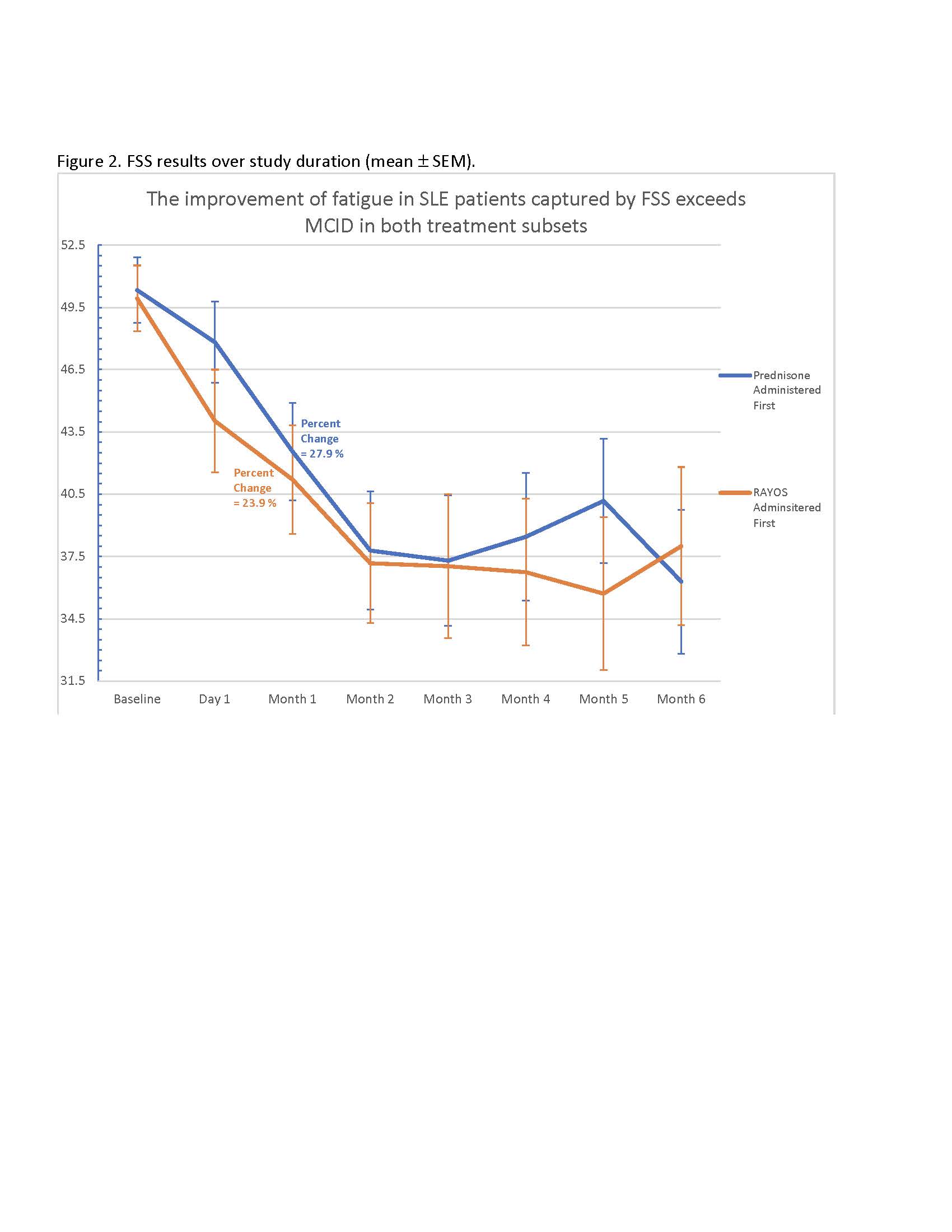Session Information
Date: Monday, November 9, 2020
Title: SLE – Treatment Poster II
Session Type: Poster Session D
Session Time: 9:00AM-11:00AM
Background/Purpose: Morning stiffness and fatigue are common symptoms in patients with SLE. Increased cytokines and disturbed sleep patterns may contribute to morning symptoms and fatigue in SLE. We, therefore, hypothesized that delayed release (DR) prednisone given in the evening might suppress morning symptoms of stiffness and fatigue better than standard immediate release (IR) prednisone given in the morning.
Methods: This was a multicenter randomized double-blind active comparator double baseline crossover study designed to compare the impact of morning IR prednisone to the same dose of evening DR prednisone in SLE patients with increased fatigue (NCT03098823). Eligible patients met ACR classification of SLE, had a Functional Assessment of Chronic Illness Therapy-Fatigue (FACIT-F) score ≤30 and were prescribed oral IR prednisone at 5-15 mg/day. Patients were randomized in a 1:1 ratio to receive either daily active DR prednisone (RAYOS) at 10pm and daily morning placebo or daily active morning IR prednisone and daily placebo capsules at 10pm at the same total dose they had previously been prescribed. After 3 months, the treatment regimens were reversed, and the patients continued for another 3 months. The primary endpoint was change in fatigue assessed by FACIT-F.
Results: 62 patients were enrolled and randomized and 60 were evaluable for treatment response. At 3 months, there was significant improvement in fatigue measure by FACIT-F, as well as by the Fatigue Severity Score (FSS) and the vitality questions of the SF-36. The mean degree of improvement in fatigue exceeded the minimal clinically important difference (MCID) (see Figures 1 and 2). However, there was no significant difference between the groups in the degree of improvement in fatigue. Following the crossover there was persistent improvement in fatigue compared to baseline, but again no significant difference between the groups. Daily estimates of morning stiffness assessed with a mobile app did not differ between the groups. The frequency of adverse events did not differ between the groups.
Conclusion: DR and IR prednisone were comparable in improving fatigue in patients with SLE. Despite no change in daily prednisone dosage from prescribed doses at entry, fatigue significantly improved, implying that one contributor to fatigue in SLE may be differences between prescribed and actual administered doses of prednisone.
To cite this abstract in AMA style:
Rainey H, Bell K, Rus V, Wallace D, Dykas C, Mora M, Comberg M, Lipsky P. Delayed and Immediate Release Prednisone Decrease Fatigue Comparably in Patients with Systemic Lupus Erythematosus [abstract]. Arthritis Rheumatol. 2020; 72 (suppl 10). https://acrabstracts.org/abstract/delayed-and-immediate-release-prednisone-decrease-fatigue-comparably-in-patients-with-systemic-lupus-erythematosus/. Accessed .« Back to ACR Convergence 2020
ACR Meeting Abstracts - https://acrabstracts.org/abstract/delayed-and-immediate-release-prednisone-decrease-fatigue-comparably-in-patients-with-systemic-lupus-erythematosus/


